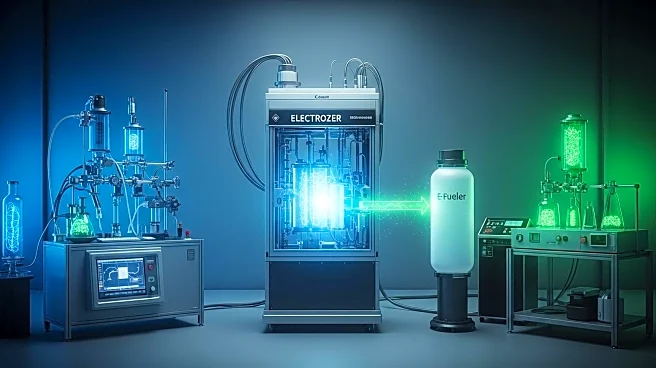What's Happening?
An EU-funded initiative, the ECO2Fuel project, is advancing carbon capture and utilization (CCU) technologies to transform carbon dioxide emissions into valuable resources like e-fuels. The project is developing a 1MW low-temperature electrolyzer that converts captured CO2 into sustainable liquid fuels using renewable electricity and water. This technology aims to decarbonize Europe's most polluting sectors by demonstrating its viability at an industrial scale. The project has already developed a 50kW stack within the electrolyzer system, which can operate at elevated pressures and recycle gas mixtures to enhance CO2 conversion. The project involves collaboration among leading businesses and research institutions, including RWE, which has successfully demonstrated a method of generating backup power using e-fuels.
Why It's Important?
The development of CCU technologies like the ECO2Fuel electrolyzer is crucial for reducing carbon emissions and promoting sustainable energy solutions. By converting CO2 into e-fuels, the project offers a potential alternative to fossil fuels, particularly for sectors where electrification is challenging. This initiative supports the European Green Deal's goals by providing a realistic solution for hard-to-abate industries such as aviation and shipping. The successful implementation of this technology could lead to significant environmental benefits and contribute to global efforts to combat climate change.
What's Next?
The ECO2Fuel project aims to scale up its electrolyzer system to 1MW by 2026, with plans for further testing and validation. The project will continue to address technical challenges related to scaling, such as sealing at higher pressures and managing gas and liquid flows. As the technology progresses, stakeholders may explore opportunities for broader adoption and integration into existing energy systems. The project's success could influence policy decisions and encourage investment in CCU technologies across Europe.
Beyond the Headlines
The ECO2Fuel project highlights the potential for CCU technologies to play a strategic role in achieving climate goals. By closing the carbon loop, the project not only reduces emissions but also creates a circular economy model that could be replicated globally. The initiative underscores the importance of collaboration between industry and research institutions in driving innovation and sustainability.









